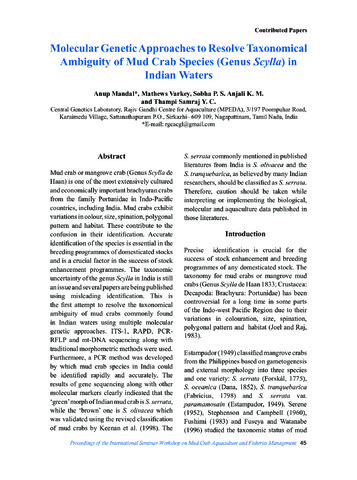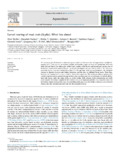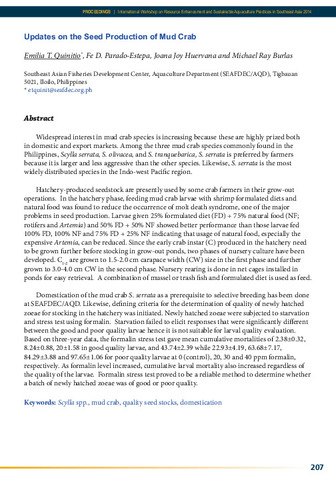Molecular genetic approaches to resolve taxonomical ambiguity of mud crab species (Genus Scylla) in Indian waters
Share
Abstract
Mud crab or mangrove crab (Genus Scylla de Haan) is one of the most extensively cultured and economically important brachyuran crabs from the family Portunidae in Indo-Pacific countries, including India. Mud crabs exhibit variations in colour, size, spination, polygonal pattern and habitat. These contribute to the confusion in their identification. Accurate identification of the species is essential in the breeding programmes of domesticated stocks and is a crucial factor in the success of stock enhancement programmes. The taxonomic uncertainty of the genus Scylla in India is still an issue and several papers are being published using misleading identification. This is the first attempt to resolve the taxonomical ambiguity of mud crabs commonly found in Indian waters using multiple molecular genetic approaches. ITS-1, RAPD, PCRRFLP and mt-DNA sequencing along with traditional morphometric methods were used. Furthermore, a PCR method was developed by which mud crab species in India could be identified rapidly and accurately. The results of gene sequencing along with other molecular markers clearly indicated that the ‘green’ morph of Indian mud crab is S. serrata, while the ‘brown’ one is S. olivacea which was validated using the revised classification of mud crabs by Keenan et al. (1998). The S. serrata commonly mentioned in published literatures from India is S. olivacea and the S. tranquebarica, as believed by many Indian researchers, should be classified as S. serrata. Therefore, caution should be taken while interpreting or implementing the biological, molecular and aquaculture data published in those literatures.
Suggested Citation
Mandal, A., Varkey, M., Sobhanan, S. P., Mani, A. K., & Thampi Sam Raj, Y. C. (2015). Molecular genetic approaches to resolve taxonomical ambiguity of mud crab species (Genus Scylla) in Indian waters. In E. T. Quinitio, F. D. Parado-Estepa, Y. C. Thampi Sam Raj, & A. Mandal (Eds.), Proceedings of the International Seminar-Workshop on Mud Crab Aquaculture and Fisheries Management, 10-12 April 2013, Tamil Nadu, India (pp. 45-58). Tamil Nadu, India: Rajiv Gandhi Centre for Aquaculture (MPEDA).
Subject
Related items
Showing items related by title, author, creator and subject.
-
Larval rearing of mud crab (Scylla): What lies ahead
Waiho, Khor; Fazhan, Hanafiah; Quinitio, Emilia T.; Baylon, Juliana C.; Fujaya, Yushinta; Azmie, Ghazali; Wu, Qingyang; Shi, Xi; Ikhwanuddin, Mhd; Ma, Hongyu (Elsevier, 2018)The increasing global demand for mud crabs (genus Scylla) and threats to the wild populations highlight the urgency of fully rearing them in captivity. Despite considerable progress in mud crab production, most crab farms ... -
Mud crab pond and pen culture
Rodriguez, Eduard M. (University of the Philippines Aquaculture Society, Inc, 2001) -
Updates on the seed production of mud crab
Quinitio, Emilia T.; Parado-Estepa, Fe D.; Huervana, Joana Joy; Burlas, Michael Ray (Aquaculture Department, Southeast Asian Fisheries Development Center, 2015)Widespread interest in mud crab species is increasing because these are highly prized both in domestic and export markets. Among the three mud crab species commonly found in the Philippines, Scylla serrata, S. olivacea, ...





